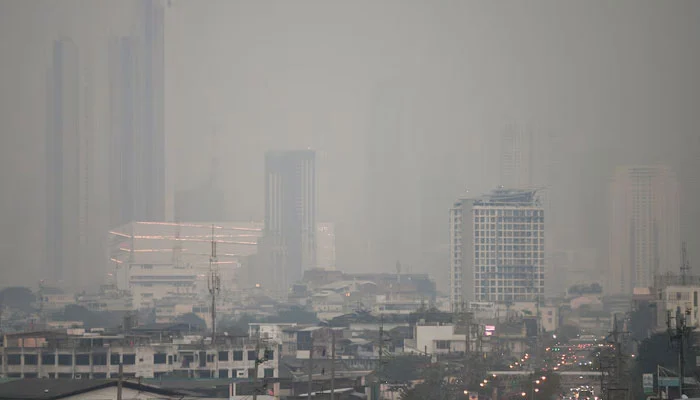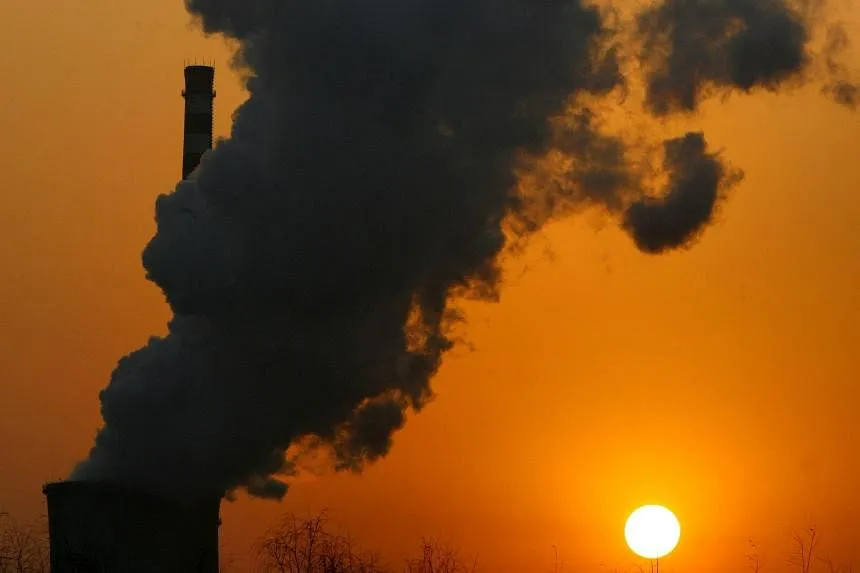SINGAPORE: Pollution from man-made emissions and other sources such as forest fires is linked to nearly 135 million premature deaths worldwide between 1980 and 2020, a Singapore university said on Monday.
Singapore’s Nanyang Technological University (NTU) unveiled the results of a study led by its researchers, saying that weather phenomena such as El Nino and the Indian Ocean Dipole have accelerated the effects of these pollutants in their concentration in the air. Is.
Air pollution linked to 135 million premature deaths
Small particles called particulate matter 2.5, or “PM 2.5,” are harmful to human health when inhaled because they are small enough to enter the bloodstream. They come from vehicle and industrial emissions, as well as natural sources such as fires and dust storms.
The university said in a statement on the study, published in the journal Environment International, that from 1980 to 2020 “was associated with approximately 135 million premature deaths globally”.
سنگاپور کی نانیانگ ٹیکنالوجیکل یونیورسٹی (این ٹی یو) نے اپنے محققین کی زیرقیادت ایک تحقیق کے نتائج کی نقاب کشائی کرتے ہوئے کہا کہ ایل نینو اور بحر ہند کے ڈوپول جیسے موسمی مظاہر نے ان آلودگیوں کے اثرات کو ہوا میں اپنے ارتکاز کو تیز کر دیا ہے۔
It found that people were dying younger than expected on average from diseases or conditions that could have been treated or prevented, including stroke, heart and lung disease, and cancer.
The study found that weather patterns increased mortality by 14 percent.

The university said Asia had the “highest number of premature deaths due to PM2.5 pollution” with more than 98 million people, most of them in China and India.
It added that Pakistan, Bangladesh, Indonesia and Japan also had significant numbers of premature deaths, ranging from 2 to 5 million.
The study is the most comprehensive study of air quality and climate to date, using 40 years of data to provide a big picture of the effects of particulate matter on health.
“Our findings suggest that changes in climate patterns could worsen air pollution,” said Steve Yim, an associate professor at NTU’s Asian School of the Environment, who led the study.
“When certain climatic events occur, such as El Niño, pollution levels may increase, which means more people may die prematurely due to PM 2.5 pollution,” Yim added.
Experts blame air pollution for 135m premature deaths
Singapore’s Nanyang Technological University (NTU) unveiled the results of a study led by its researchers, saying that weather phenomena such as El Nino and the Indian Ocean Dipole have accelerated the effects of these pollutants in their concentration in the air. Is.
Small particles called particulate matter 2.5, or “PM 2.5,” are harmful to human health when inhaled because they are too small to enter the bloodstream. They come from vehicle and industrial emissions, as well as natural sources such as fires and dust storms.
The university said in a statement on the study, published in the journal Environment International, that from 1980 to 2020 “was associated with approximately 135 million premature deaths globally”.
“This highlights the need to understand and account for these climate patterns to address air pollution to protect global population health.”
Singaporean researchers studied US National Aeronautics and Space Administration (NASA) satellite data on the levels of particles in Earth’s atmosphere.
They analyzed data on deaths from pollution-related diseases from the US-based Institute for Health Metrics and Evaluation, an independent research center.
Information on weather patterns during this period was obtained from the National Oceanic and Atmospheric Administration in the United States.

While the study focused only on the effects of normal weather patterns on air pollution, Yim said the effects of climate change would be the subject of future studies.
Researchers from universities in Hong Kong, Great Britain and China were also involved in the research.
The World Health Organization has stated that “the combined effects of ambient air pollution and indoor air pollution” are associated with 6.7 million premature deaths worldwide each year.

